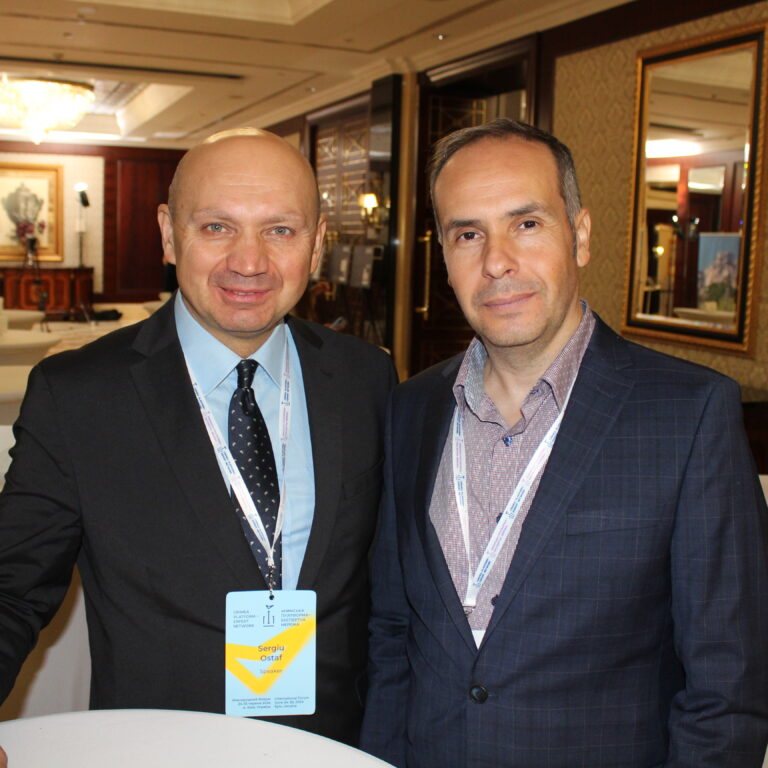On September 20, 2023, the so-called “parliament of Crimea” “approved in the first reading the changes” to the “laws” regarding “perpetuating the memory of those killed in defense of the homeland” and their burial on the territory of the Crimean peninsula. However, the real goal is an attempt to extend the “provisions” of these “laws” to the dead participants of the full-scale invasion of Ukraine. If, or rather when, the “draft law” is “approved” finally, the occupying “executive authorities” will oblige such fake “local self-government bodies” to arrange “military burials” in Crimea for the participants of the Russian aggression against Ukraine.
What legal status can these illegal cemeteries have in the legal field of Ukraine, researched associate professor Andrii Chvalyuk, especially for the Association of Reintegration of Crimea. Our Association has already written about the mass burials of soldiers of the aggressor state in the occupied territories and the subsequent illegal “memorialization” of war criminals. In particular, according to the Office of the President of Ukraine in the ARC, as of the beginning of 2023, the number of graves of Russian soldiers in Crimea amounted to several hundred and was constantly growing. At first, burials were carried out in active cemeteries, but similar places are running out and the fake “authority” of the occupied Crimea is stepping up measures to “heroize” Russian servicemen who died during the full-scale invasion of Ukraine. “Officials” promise to arrange for them “special burial places” and “organize honors” on a par with veterans of the Second World War.
The basis of the legal status of the burial places of certain foreign servicemen on the territory of Ukraine is the norms of international law. This is specifically stated in Art. 30 of the Law of Ukraine “On Burials and Funeral Matters” (hereinafter – Law No. 1102-IV), which establishes that the procedure for maintaining the burial sites of Ukrainian servicemen located on the territory of other states and the procedure for maintaining the burial sites of foreign servicemen on the territory of Ukraine are defined as appropriate international treaties of Ukraine. An example of such an agreement is the Agreement between the Government of Ukraine and the Government of the Republic of Hungary on the preservation and perpetuation of places of memory of fallen servicemen and civilian victims of wars and on the status of burials [4]. According to the mentioned document, “the parties ensure the protection and indefinite preservation of the burials of fallen military personnel and civilian victims of wars on the territory of their states, in particular, monuments and other memorial structures.” Agreements on similar issues have not been concluded with the Russian Federation. The existing Agreement on Perpetuating the Memory of the Courage and Heroism of the Peoples of the CIS Participating States in the Great Patriotic War of 1941-1945 concerns only the burial places of servicemen who died during the Great Patriotic War.
The current state of affairs, and the official position of the Ministry of Foreign Affairs of Ukraine, rejects the possibility of any cooperation with the aggressor state until the international armed conflict between Russia and Ukraine is completed. And taking into account how the Russian Federation has recently treated the fulfillment of its international obligations, we have serious doubts about the possibility of establishing post-war international cooperation with Russia on any issues, including the preservation of the graves of fallen servicemen. In addition, in addition to citizens of the aggressor, an obvious significant part of these burials will not be Russian colonizers, but citizens of Ukraine who were killed in the ranks of the army of the aggressor state. Thus, the status of “military burials” created by the aggressor country on the territory of Ukraine is currently regulated by the national legislation of Ukraine.
In this dimension, let’s investigate in more detail the issue of the murdered Russian colonizers who are not citizens of Ukraine. According to Art. 33 of Law No. 1102-IV, Ukraine participates in international cooperation in the burial of the dead in accordance with the law and international treaties of Ukraine, takes measures to bury on the territory of Ukraine foreigners, stateless persons who temporarily stayed (lived) on the territory of Ukraine.
The legal collision lies in the fact that the concept of “temporary stay (residence)” is a category of migration legislation and assumes that a foreigner (a stateless person) is in Ukraine on legal grounds. Taking into account the fact that the visa-free regime for entry, exit, and transit of citizens of the Russian Federation on the territory of Ukraine was canceled on July 17, 2022, all Russian citizens who did not immediately apply for refugee status or asylum after that date in Ukraine, or have not received a visa within the next 90 days, in accordance with Clause 14 of Article 1 of the Law of Ukraine “On the Legal Status of Foreigners and Stateless Persons” are illegal migrants and do not have the right to burial in accordance with Law No. 1102-IV. In addition, it is obvious that the absolute majority of Russian colonizers who are buried or will be buried in Crimean cemeteries were on the occupied peninsula illegally. However, another provision of Law No. 1102-IV establishes that “the burial of deceased foreigners and stateless persons (without specifying the legal status of their stay – Author) is carried out in the manner established by this Law for citizens of Ukraine, unless otherwise provided by an international treaty of Ukraine”.
So, regardless of the presence of this legal collision, it can be confidently stated that the corpse of an illegal migrant will not be left lying in the open. The burial of persons without a definite place of residence, citizens whose burial was refused by their relatives, unrecognizable corpses found (the corpses of illegal migrants can conditionally be included in these categories – Author), is carried out by local self-government bodies at the expense of the relevant local budgets. In this way, the problem with individual burials of Russians in the territories controlled by Ukraine can be solved quite simply. Mass burials of Russians in so-called “military cemeteries” that the occupying “authority” plans to create in Crimea are another matter.
“A place of burial is a cemetery, crematorium, columbarium, or other building or structure intended for organizing the burial of the dead. Land for burial sites is allocated in accordance with the procedure established by law by local self-government bodies and their executive bodies”. Since the authorized bodies of local self-government in the AR of Crimea did not give permission for burials of servicemen of the Russian Federation to be placed on their territories, they have no legal status in the domestic legal field, and these cemeteries do not have and are nothing more than the discovered place of an unknown burial. “On the basis of the conclusions of the survey and study of the identified places of unknown burials, local self-government bodies can grant them the status of a cemetery with further regulation of its territory in accordance with the law”. And they may not provide it. And then either the remains of the deceased will be reburied or, after proper identification, they will be (if there is a petition) handed over to their relatives for export outside of Ukraine and burial in their homeland.
After the deoccupation of the Crimea, the graves of Russian servicemen placed on a specially allocated plot of land on the territory of existing cemeteries can receive a slightly different, albeit rather blurred, status. According to Ukrainian legislation, they are not subject to demolition and “can be moved only by decision of the relevant local self-government body in case of permanent flooding, landslide, earthquake or other natural disaster”. However, are they graves in the sense of the law?
Rules for burial in cemeteries on the territory of settlements located on the territory of a certain council are approved at the sessions of these councils and provide that the digging of a grave must be agreed with the executive committee of this council. Arbitrary burial without the permission of the executive committee of the council is inadmissible and entails administrative responsibility under Art. 53-1 of the Code of Ukraine on administrative offenses “Arbitrary occupation of land”. Persons guilty of arbitrary occupation of land may also be held criminally or civilly liable.
Arbitrary occupation of a plot of land, which causes significant damage to its legal owner or owner, is punishable by a fine of two hundred to three hundred tax-free minimum incomes of citizens or arrest for a term of up to six months (Part 1 of Article 197-1 of the Criminal Code of Ukraine). Arbitrary construction of buildings or structures on an arbitrarily occupied plot of land is punishable by a fine from one thousand to four thousand non-taxable minimum incomes of citizens or by arrest for a term of up to six months, or restriction of freedom for a term of up to three years (Part 3 of Article 197-1 of the Criminal Code of Ukraine ). That is, all burial structures installed in the Crimea on graves excavated after March 18, 2014 are illegal objects. Moreover, the area of the illegal “military cemetery” located on the territory of a certain council may be large enough to qualify as “significant damage” and bring criminal charges against the guilty parties.
According to Art. 212 of the Land Code of Ukraine, arbitrarily occupied land plots are subject, based on a court decision, to be returned to land owners or land users without compensation for costs incurred during their illegal use. Bringing land plots into a usable state, including the demolition of houses, buildings and structures, is carried out at the expense of citizens or legal entities that have arbitrarily occupied land plots [12].
Therefore, it can be concluded that after the deoccupation of Crimea, under the conditions of preservation of the current legislation, there will be a need to conduct a significant number of court proceedings with the aim of returning the plots of land arbitrarily occupied for illegal cemeteries to their owners and bringing the persons guilty of this seizure to justice. At the same time, a certain factor regarding the actions of the Ukrainian authorities regarding the “military cemeteries” of the aggressor is the 1949 Convention (I) for the Amelioration of the Condition of the Wounded and Sick in Armed Forces in the Field, which in Article 17 prescribes that the parties to the conflict ensure such a situation that the burial or cremation of the dead carried out, as far as the circumstances allow, individually, a thorough, if possible, medical examination of the bodies is preceded by the determination of death, identification and the possibility of drawing up a report.
The parties to the conflict, says this article, shall, in addition, ensure the dignified burial of the dead, as far as possible in accordance with the rites of the religion to which they belonged, the respectful treatment of their graves, the grouping of graves, as far as possible, according to the nationality of the deceased, the proper care of the graves and the marking them so that they can always be found. To this end, at the beginning of hostilities, they organize an official grave registration service to enable future exhumations and to ensure, regardless of the location of the graves, that bodies can be identified and possibly repatriated. These provisions shall likewise apply to ashes held by the Graves Registration Service until they are properly disposed of in accordance with the wishes of the deceased’s homeland.
The aggressor does not comply with the provisions of this article either in the Crimea or in the occupied mainland territory of Ukraine, but this does not exempt Ukraine from the need to comply with the provisions of this norm in the de-occupied peninsula, for which appropriate special organizational and legal mechanisms should be provided in advance, which would make impossible the criminal “glorification” for aggressor’s soldiers.







